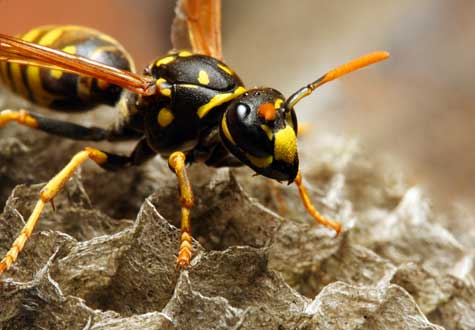Summer is finally here, and that means bees are more active. Bees play an important part in our lives by transferring pollen that helps many plants, flowers, fruits and vegetables grow and thrive. While they can be a nuisance if they build nests near our homes, the best advice is to leave the bees alone. Of course, there still is a chance of bee stings.
I talked to Nathan Charlton, MD, about what to do for bee stings. Charlton is a toxicologist who plays an important role at the Blue Ridge Poison Center as well as the UVA Wilderness Medicine Program. With his experience, he’s seen a fair share of people with bee stings and was able to provide great information and advice.
Bees in Virginia
The good news is that the vast majority of bees are docile and non-aggressive. They usually only sting if you disturb their nest or try to grab or swat them. But according to the Centers for Disease Control and Prevention, bee, wasp and hornet stings accounted for more animal-related deaths in the U.S. from 2001-2013 than any other animal. This statistic was pretty surprising to me. I didn’t expect bee stings to be at the top of the list. In Virginia, Charlton says that honey bees are typically the most likely culprits when it comes to seeing patients for bee stings.
The most aggressive type of wasps in Virginia are yellow jackets. I can confirm this, as I have had the misfortune of being attacked by yellow jackets twice while I was mowing the lawn and disturbed a yellow jacket nest in the ground. The first time, I was stung multiple times through my clothing before I could sprint back to the house. After I got inside, I discovered several bees sting clung to my shirt and were inside my shoes. Aggressive for sure! Luckily, I am not allergic to bee or wasp stings and only had to deal with soreness for a day or so.
Treatment: What to Do for Bee Stings
Tips to Prevent Bee Stings
- Cover food and drinks while outside
- Pick up any trash
- Remove fallen fruits
- Be cautious around flowers
“Around 85 to 90 percent of people are not allergic to bees and only have local venom reactions such as redness, swelling and soreness,” says Charlton. They can be treated in a number of ways. He recommends:
- Ice
- Over-the-counter medications like hydrocortisone cream, antibiotic ointment, anti-inflammatory such as ibuprofen
You can also take an appropriate dose of Benadryl as a precaution.
How to a Bee Stinger
Make sure that the bee did not leave a stinger behind in your skin. Honey bees do; other stinging insects like yellow jackets and wasps will not lose their stinger and can sting multiple times.
If you find a stinger, remove it by gently swiping it away with a credit card or something similar to avoid squeezing the venom sack.
How to Tell If You’re Allergic to Bee Stings
Five to ten percent of people may experience a larger local reaction to a bee sting. The area around the sting may become more sore and the swelling could increase. If these symptoms occur for longer than a few days, you should visit your doctor.
So, what about those who are allergic to bees? Around 1 to 3 percent of the population experience an anaphylaxis reaction. Unfortunately, most people won’t know if they are allergic to bee stings until they are stung by one. You can also develop an allergy to bees later in life, Charlton says. So even if you’ve been stung before and never had a reaction, it may not always work out that way.
Stung by a Bee?
If you get stung and are experiencing an anaphylactic reaction such as dizziness or shortness of breath, call 911 to get emergency treatment. If you have questions about bee stings or other insect bites, call the Blue Ridge Poison Center at 1-800-222-1222.
Therefore, it’s important to know the symptoms of anaphylaxis, a life-threatening reaction. They include:
- Headaches
- Nausea
- Diarrhea
- Hives
- Dizziness
- Trouble breathing
Many people think it takes multiple stings to cause anaphylaxis, but you only need one. “These tend to be the worst cases — when someone gets stung, and they don’t realize that they are allergic and either ignore or don’t recognize the symptoms,” says Charlton.
If you start to develop symptoms of a bee sting allergy, you should seek medical attention immediately. Anaphylactic reactions can be life threatening and require emergency treatment, so you should call 911 immediately.
